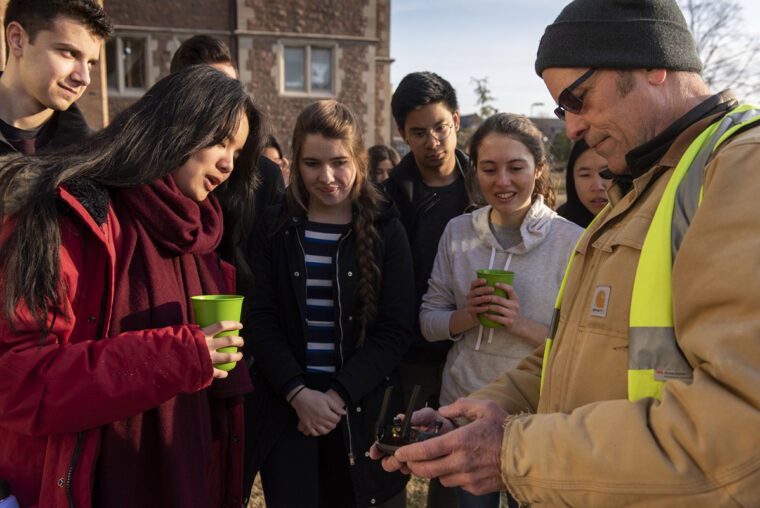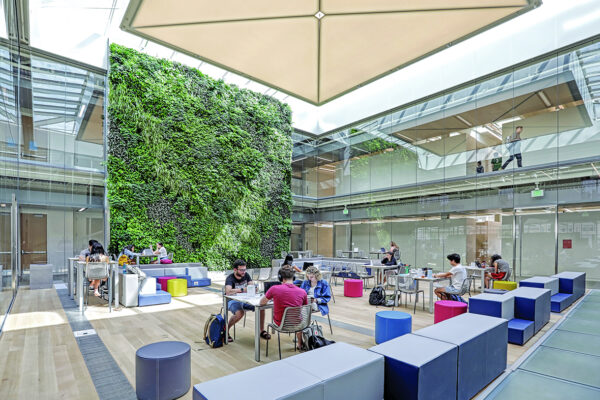Washington University in St. Louis now offers a major in environmental analysis through the Environmental Studies program in Arts & Sciences. The interdisciplinary major is a response to global demand for environmental and sustainability experts who can think critically, communicate clearly and solve problems in collaboration with their communities.
“When you look at the big issues facing humanity, they are all touching on the environment — climate change, environmental justice, environmental health,” said David Fike, director of environmental studies, professor of earth and planetary sciences in Arts & Sciences and associate director of the International Center for Energy, Environment & Sustainability (InCEES). “The new environmental analysis major will provide students a foundation in the natural sciences, the social sciences and the humanities, and give them the skills to put that knowledge into an analysis-forward framework. It’s an interdisciplinary approach that reflects what’s happening in the real world.”
Previously, Arts & Sciences students who wanted to focus on the environment were largely limited to three majors: environmental earth sciences in the Department of Earth & Planetary Sciences; environmental biology in the Department of Biology; or environmental policy in the Department of Political Science. This new major provides a home — literally and figuratively — for students who are seeking both a more applied curriculum and a cohort experience. Environmental studies faculty share the second floor of the new Schnuck Pavilion with the Office of Sustainability, where many students work on university sustainability projects such as expanding solar power on campus, inventorying building energy usage and reducing food waste.
“Students were scattered across campus, and so were faculty,” Fike said. “Now the university has a strong, robust environmental program that not only does the academics and the research, but the practice and the engagement.”
Core disciplinary classes include “One Health: Linking Health of Human, Animals, Environment,” “Sustainability in Business” and “To Sustainability and Beyond: People, Planet, Prosperity.”
In addition, students are required to take coursework in analysis, social identity and communication, such as “Environmental Writing,” “Field Methods for Environmental Science,” “Social Inequality in America” and “Environmental Problem Solving.”
Electives are offered in sociology, political science, anthropology and other disciplines. Fike said that scientists need a fundamental understanding of social systems and political forces to make progress.
“Data, alone, is never the full answer,” Fike said. “All real-world problems are embedded in communities. Making sure our students have skills in communication and awareness of community issues is how you make a real impact.”
The Environmental Studies program is among the few with a dedicated community engagement coordinator. Carolyn Cosgrove Payne currently serves in that role and has worked with past and current external partners including A Red Circle, Restorative Justice Movement Center, Missouri Coalition for the Environment, Green Cities Coalition, Metro and St. Louis city.
“This experiential, community-based learning is one of the things that we do really well,” said, Eleanor Pardini, assistant director of environmental studies and senior lecturer. “We teach our students, it’s not just the work you do but how you do it. Are you engaging in a meaningful way with the community partner? Do you know how to tap into the expertise and knowledge of the community? You will have a better solution if you have more people and voices at the table.”




Comments and respectful dialogue are encouraged, but content will be moderated. Please, no personal attacks, obscenity or profanity, selling of commercial products, or endorsements of political candidates or positions. We reserve the right to remove any inappropriate comments. We also cannot address individual medical concerns or provide medical advice in this forum.